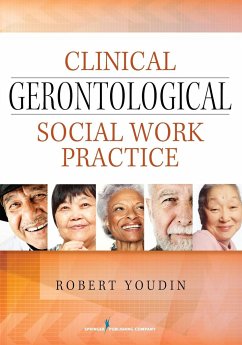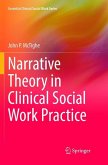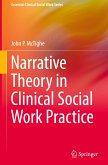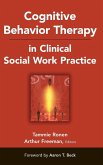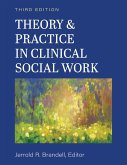Robert Lcsw Youdin
Clinical Gerontological Social Work Practice
Robert Lcsw Youdin
Clinical Gerontological Social Work Practice
- Broschiertes Buch
- Merkliste
- Auf die Merkliste
- Bewerten Bewerten
- Teilen
- Produkt teilen
- Produkterinnerung
- Produkterinnerung
This book has a forward-thinking orientation that reflects the reality of aging with older adults throughout the aging life course... Dr. Youdin integrates an advanced clinical social work practice with in-depth knowledge of evidence-based practice as well asd geriatric medicine, psychiatry and gerontology." -- The Lamp Written by an expert in gerontological social work and curriculum development, this book provides a wealth of clinical information for social workers and other health care professionals who counsel older adults. It describes a strengths-based, empowerment approach to treatment…mehr
Andere Kunden interessierten sich auch für
![Narrative Theory in Clinical Social Work Practice Narrative Theory in Clinical Social Work Practice]() John P. McTigheNarrative Theory in Clinical Social Work Practice37,99 €
John P. McTigheNarrative Theory in Clinical Social Work Practice37,99 €![Narrative Theory in Clinical Social Work Practice Narrative Theory in Clinical Social Work Practice]() John P. McTigheNarrative Theory in Clinical Social Work Practice52,99 €
John P. McTigheNarrative Theory in Clinical Social Work Practice52,99 €![Cognitive Behavior Therapy in Clinical Social Work Practice Cognitive Behavior Therapy in Clinical Social Work Practice]() Cognitive Behavior Therapy in Clinical Social Work Practice117,99 €
Cognitive Behavior Therapy in Clinical Social Work Practice117,99 €![Gerontological Social Work and the Grand Challenges Gerontological Social Work and the Grand Challenges]() Gerontological Social Work and the Grand Challenges52,99 €
Gerontological Social Work and the Grand Challenges52,99 €![Feminist Social Work Practice in Clinical Settings Feminist Social Work Practice in Clinical Settings]() Mary Bricker-Jenkins / Nancy R. Hooyman / Naomi Gottlieb (eds.)Feminist Social Work Practice in Clinical Settings139,99 €
Mary Bricker-Jenkins / Nancy R. Hooyman / Naomi Gottlieb (eds.)Feminist Social Work Practice in Clinical Settings139,99 €![Theory and Practice in Clinical Social Work Theory and Practice in Clinical Social Work]() Theory and Practice in Clinical Social Work155,99 €
Theory and Practice in Clinical Social Work155,99 €![Clinical Social Work Practice and Regulation Clinical Social Work Practice and Regulation]() Laura W. GroshongClinical Social Work Practice and Regulation61,99 €
Laura W. GroshongClinical Social Work Practice and Regulation61,99 €-
-
-
This book has a forward-thinking orientation that reflects the reality of aging with older adults throughout the aging life course... Dr. Youdin integrates an advanced clinical social work practice with in-depth knowledge of evidence-based practice as well asd geriatric medicine, psychiatry and gerontology." -- The Lamp Written by an expert in gerontological social work and curriculum development, this book provides a wealth of clinical information for social workers and other health care professionals who counsel older adults. It describes a strengths-based, empowerment approach to treatment that integrates theory, technique, advocacy, and social policy, and encompasses the tenets of human rights. The book's content has been tested in the classroom setting for a three-year period with advanced social work undergraduate and graduate students. The book examines various theories of aging including a contrast between the strengths-based person-in-environment theory and the pathologically based medical model of psychological problems. It advocates truly engaging with the older client during the assessment phase, and discusses a variety of intervention modalities. The psychological construct of stigma regarding aging is examined, along with the major psychopathological problems common to older adults. The book also considers Alzheimer's disease and dementia, medical problems of older adults and co-occurring psychological problems, substance abuse, older adult sexuality, elder abuse, and the vulnerabilities of gay, lesbian, bisexual, and transgender older adults. Additionally, the book addresses mental health issues pertaining to residential settings and the aspects of death and dying that give older people concern. Extensive case studies, learning objectives, and discussion questions are featured in each chapter. The book also includes an instructor packet, PowerPoint slides, and an interactive PDF. Key Features: Provides a wealth of classroom-tested clinical information Espouses a strengths-based approach to treatment that integrates theory, technique, advocacy, and social justice Consistent with social work mandates for a human rights focus Presents extensive case studies, learning objectives, and discussion questions in each chapter Includes an instructors packet, PowerPoint slides, and interactive PDF
Hinweis: Dieser Artikel kann nur an eine deutsche Lieferadresse ausgeliefert werden.
Hinweis: Dieser Artikel kann nur an eine deutsche Lieferadresse ausgeliefert werden.
Produktdetails
- Produktdetails
- Verlag: Springer Publishing Company
- Seitenzahl: 290
- Erscheinungstermin: 13. Mai 2014
- Englisch
- Abmessung: 254mm x 178mm x 16mm
- Gewicht: 550g
- ISBN-13: 9780826129895
- ISBN-10: 0826129897
- Artikelnr.: 39379710
- Herstellerkennzeichnung
- Books on Demand GmbH
- In de Tarpen 42
- 22848 Norderstedt
- info@bod.de
- 040 53433511
- Verlag: Springer Publishing Company
- Seitenzahl: 290
- Erscheinungstermin: 13. Mai 2014
- Englisch
- Abmessung: 254mm x 178mm x 16mm
- Gewicht: 550g
- ISBN-13: 9780826129895
- ISBN-10: 0826129897
- Artikelnr.: 39379710
- Herstellerkennzeichnung
- Books on Demand GmbH
- In de Tarpen 42
- 22848 Norderstedt
- info@bod.de
- 040 53433511
Robert Youdin, PhD, is an independent scholar at the Princeton Research Forum. He has been a private practitioner for the past 31 years and practices in Princeton, New Jersey.
Foreword Patricia Brownell, PhD xiii
Preface xvii
Acknowledgments xxiii
PART I: OVERVIEW OF THEORIES, ASSESSMENT TECHNIQUES,
AND TREATMENT APPROACHES TO THE OLDER ADULT CLIENT
1. Theories to Inform the Social Worker Practicing With Older Adults 3
The Need for a Unifying Gerontological Social Work Theoretical Orientation
4
Theory Circle 5
Suggested Theories to Inform the Social Worker Treating Older Adults 6
Age Stages 6
Psychological and Social Aging Theories 8
Erikson's Stages Theory 8
The Medical Model 9
Person-in-Environment Theory and Resilience: A Good Partnership 10
Person-in-Environment Theory: The Beginning 12
Perception of Control 13
The Case of Georgina 14
Summary 17
Discussion Topics 17
2. Assessing an Older Adult 19
Part 1: Environmental and Communication Challenges to Be Overcome by the
Social Worker and Older Client 20
Offi ce Assessment Setting 20
A Matter of Speaking 20
Home, Nursing Home, Assisted Care Facility, or Hospital Assessment
Setting 21
Working the Clock 21
To Take or Not Take Notes 22
Part 2: Assessment Categories 22
Gender, Age, Ethnicity, Sexual Orientation 22
Presenting Problem 23
Environmental and Demographic Information 24
Developmental History 24
Medical Status 25
Sexual Assault History 26
Sexual History 26
Substance Use 26
Psychiatric History 27
Appearance 27
Attitude 27
Motor Status 27
Speech Quality 28
Thought Process 28
Mood/Affect 28
Sleep/Appetite Status 29
Suicide Assessment 29
Rational Suicide 31
Homicidal Assessment 32
Mental Status Exam 33
Spirituality/Religion 36
Older Adult Abuse 36
Collateral Interviews 36
DSM-5 Diagnosis 36
The Case of Dr. Frank 37
Gender, Age, Ethnicity, Sexual Orientation 37
Presenting Problem 37
Environmental and Demographic Information 37
Developmental History 38
Medical Status 39
Sexual Assault History 40
Sexual History 40
Substance Use 40
Psychiatric History 40
Appearance 41
Attitude 41
Motor Status 41
Speech Quality 41
Thought Process 41
Mood/Affect 41
Sleep/Appetite Status 41
Suicide Assessment 42
Homicidal Assessment 42
Mental Status Exam 43
Sensorium 43
Spirituality/Religion 43
Older Adult Abuse 44
Collateral Interviews 44
DSM-5 Diagnosis 44
Goals for Change 44
Summary 44
Discussion Topics 45
3. Intervention Theories Informing the Clinician Treating Older Adults 47
Are Theories an Uncontaminated View of an Older Adult? 49
Sources of Contamination 49
Sorry, No Theory Available 49
Ageism 49
The New Ageism 50
The Incompetence Model 50
The Geriactivist Model 50
Theoretical Orientations for Treating Older Adults 51
Foundations Underlying Existential, Brief Solution, Cognitive Behavioral,
and Narrative Therapies 51
Empowerment Theory and the Strength Perspective 51
Constructivist Theory 52
Existential Theory 52
Cognitive Behavioral Theory 55
Narrative Theory 56
Reminiscence Therapy 58
Feminist Theory 58
The Case of Henriqua 59
Summary and Applications of Theoretical Orientations to Henriqua's Case 60
Henriqua Through the Optic of Existential-Phenomenological Theory 60
Henriqua Through the Optic of Cognitive Behavioral Theory 62
Henriqua Through the Optic of Narrative and Reminiscence Theory 63
Henriqua Through the Optic of Feminist Theory 64
Discussion Topics 64
4. Stigma and Older Adults 65
Examples of Optics Affected by Stigma and Their Subsequent Effects on Older
Adults 66
Ageism 67
Race/Ethnicity/Sexual Orientation 68
Gender 69
Poverty 70
Policy 71
Psychological Problems 72
Medical Illness 75
The Internet: A Tool for Fighting Stigma 76
The Case of Michael 77
Summary 79
Discussion Topics 79
PART II: SPECIALIZED PROBLEMS AND ORIENTATIONS IN
GERONTOLOGICAL SOCIAL WORK PRACTICE
5. Psychopathological Problems in Older Adults 83
The Medical Model of Psychopathology 83
Psychopathological Problems in Older Adults 85
Anorexia Tardive 86
Anxiety Disorders 86
Co-Occurring Psychological Disorders and Substance Abuse/Dependence
Disorders 87
Delusional Disorder 88
Mood Disorders 88
Personality Disorders 90
Schizophrenia 91
Suicide 91
The Case of Anthony 93
Summary 94
Discussion Topics 95
6. Alzheimer's Disease and Other Dementias 97
Mild Cognitive Impairment 97
Vascular Dementia 98
Dementia With Lewy Bodies 98
Frontal Lobe Dementia (Including Pick's Disease) 99
Korsakoff Syndrome 99
Parkinson's Disease 99
Alzheimer's Disease 99
Stage 1 100
Stage 2 100
Stage 3 100
Stage 4 100
Stage 5 101
Stage 6 101
Stage 7 101
A Basic Guide to Medicines for Alzheimer's Disease 101
Neurotransmitters 102
Therapeutic Interventions for Alzheimer's Disease Patients 104
Agitation States Common to Dementias 104
Caregiver Support Groups 105
Psychotherapeutic Interventions in Early-Stage Dementias 105
Psychoeducational Support Groups for Alzheimer's Disease Patients 105
Leisure Activities and Therapeutic Recreation 106
Cognitive Training Intervention Programs 107
Driving Retirement 107
Fall Risk With Dementia 108
Inappropriate Sexual Behaviors 108
Dementia in Imprisoned Older Adults 108
Long-Term Care for Dementia 108
The Case of Daiki 108
Summary 110
Discussion Topics 111
7. Medical Problems in Older Adults 113
Commonly Occurring Medical Problems Experienced by Older Adults 113
Arthritis 113
Cardiovascular Diseases 114
Cancers 116
Chronic Obstructive Pulmonary Disease 117
Diabetes 117
Eye Disorders 118
Hearing Disorders 119
Osteoporosis 119
Pain 120
Pressure Ulcers 121
Sleep Disorders 121
Urinary Disorders 121
Interventions for Older Adults With Chronic Illnesses and Their Families
122
The Case of Miguel 122
Summary 124
Discussion Topics 125
8. Older Adult Substance Abusers 127
Chronic Versus Situational Substance Abuse 129
Alcohol Abuse/Dependence 130
Nonalcohol Substance Use Disorders 132
Benzodiazepine Abuse/Dependence Disorders 132
Opioid/Synthetic Opioid Abuse/Dependence Disorders 133
An Existential Analysis of Older Adult Substance Abuse/Dependence 134
Motivational Interviewing 135
Cognitive Behavioral Interventions 136
Integrating Motivational Interviewing With Other Therapeutic Modalities
137
The Case of Pauline 138
Summary 139
Discussion Topics 140
9. Older Adult Sexuality 141
Men 142
Erectile Dysfunction Treatments 143
Women 143
Gay Male and Lesbian Couples 144
Heterosexual Couples 144
Sexuality and Dementia 146
Caregiver Sexual Education for Dementia Patients 146
HIV/AIDS 147
Nursing Homes 148
Older Adult Sexuality and Religion/Spirituality 149
The Case of Lim and Jun 149
Summary 150
Discussion Topics 151
10. Older Adult Abuse 153
Prevalence of Older Adult Abuse 155
Perpetrators of Older Adult Abuse 156
Assisted Living Facilities and Nursing Homes 156
Long-Term Care at Home 157
Older Adults' Perceptions as Potential Crime Victims 158
Sexual Violence 158
Disabled Older Adults 159
Older Adult Prisoner Abuse 159
Historical Programs to Address Older Adult Prisoner Abuse 159
Older Adults' Self-Abuse 160
Self-Neglect 160
Self-Harm 161
Interventions for Older Adult Abuse, Self-Neglect, and Self-Harm 162
The Case of Gloria 164
Summary 166
Discussion Topics 166
11. Gay Male, Lesbian, Bisexual, and Transgender Older Adults 167
Coming Out in Later Life 168
Older LGBT Sexuality and HIV 169
Substance Abuse 170
Older Gay Inmates 171
Clinical Intervention 171
Concerns About Health Service Delivery 172
Interventions 173
Mental Health Issues 173
Retirement and Housing 175
The Case of Sheri and Camila 176
Summary 177
Discussion Topics 178
12. Care and Residential Settings for Older Adults 179
Retirement Communities 180
Gay-Oriented Retirement Communities 181
Aging in Place 181
Adult Day Care Services 182
Continuing Care and Assisted Living 183
Housing for Aging Inmates: A New Type of Aging in Place 185
Nursing Homes 185
Goals for Improved Experiences in All Types of Care and Residential
Settings 186
The Case of Adanna 188
Summary 190
Discussion Topics 191
13. Dying and Death 193
End-of-Life Planning 193
End-of-Life Palliative Care 195
Intensive Care and Terminal Illness 198
Euthanasia 199
Place of Death 200
End-of-Life Psychotherapy 201
Grief Counseling 201
The Case of Yael 204
Summary 205
Discussion Topics 205
References 207
Index 251
Preface xvii
Acknowledgments xxiii
PART I: OVERVIEW OF THEORIES, ASSESSMENT TECHNIQUES,
AND TREATMENT APPROACHES TO THE OLDER ADULT CLIENT
1. Theories to Inform the Social Worker Practicing With Older Adults 3
The Need for a Unifying Gerontological Social Work Theoretical Orientation
4
Theory Circle 5
Suggested Theories to Inform the Social Worker Treating Older Adults 6
Age Stages 6
Psychological and Social Aging Theories 8
Erikson's Stages Theory 8
The Medical Model 9
Person-in-Environment Theory and Resilience: A Good Partnership 10
Person-in-Environment Theory: The Beginning 12
Perception of Control 13
The Case of Georgina 14
Summary 17
Discussion Topics 17
2. Assessing an Older Adult 19
Part 1: Environmental and Communication Challenges to Be Overcome by the
Social Worker and Older Client 20
Offi ce Assessment Setting 20
A Matter of Speaking 20
Home, Nursing Home, Assisted Care Facility, or Hospital Assessment
Setting 21
Working the Clock 21
To Take or Not Take Notes 22
Part 2: Assessment Categories 22
Gender, Age, Ethnicity, Sexual Orientation 22
Presenting Problem 23
Environmental and Demographic Information 24
Developmental History 24
Medical Status 25
Sexual Assault History 26
Sexual History 26
Substance Use 26
Psychiatric History 27
Appearance 27
Attitude 27
Motor Status 27
Speech Quality 28
Thought Process 28
Mood/Affect 28
Sleep/Appetite Status 29
Suicide Assessment 29
Rational Suicide 31
Homicidal Assessment 32
Mental Status Exam 33
Spirituality/Religion 36
Older Adult Abuse 36
Collateral Interviews 36
DSM-5 Diagnosis 36
The Case of Dr. Frank 37
Gender, Age, Ethnicity, Sexual Orientation 37
Presenting Problem 37
Environmental and Demographic Information 37
Developmental History 38
Medical Status 39
Sexual Assault History 40
Sexual History 40
Substance Use 40
Psychiatric History 40
Appearance 41
Attitude 41
Motor Status 41
Speech Quality 41
Thought Process 41
Mood/Affect 41
Sleep/Appetite Status 41
Suicide Assessment 42
Homicidal Assessment 42
Mental Status Exam 43
Sensorium 43
Spirituality/Religion 43
Older Adult Abuse 44
Collateral Interviews 44
DSM-5 Diagnosis 44
Goals for Change 44
Summary 44
Discussion Topics 45
3. Intervention Theories Informing the Clinician Treating Older Adults 47
Are Theories an Uncontaminated View of an Older Adult? 49
Sources of Contamination 49
Sorry, No Theory Available 49
Ageism 49
The New Ageism 50
The Incompetence Model 50
The Geriactivist Model 50
Theoretical Orientations for Treating Older Adults 51
Foundations Underlying Existential, Brief Solution, Cognitive Behavioral,
and Narrative Therapies 51
Empowerment Theory and the Strength Perspective 51
Constructivist Theory 52
Existential Theory 52
Cognitive Behavioral Theory 55
Narrative Theory 56
Reminiscence Therapy 58
Feminist Theory 58
The Case of Henriqua 59
Summary and Applications of Theoretical Orientations to Henriqua's Case 60
Henriqua Through the Optic of Existential-Phenomenological Theory 60
Henriqua Through the Optic of Cognitive Behavioral Theory 62
Henriqua Through the Optic of Narrative and Reminiscence Theory 63
Henriqua Through the Optic of Feminist Theory 64
Discussion Topics 64
4. Stigma and Older Adults 65
Examples of Optics Affected by Stigma and Their Subsequent Effects on Older
Adults 66
Ageism 67
Race/Ethnicity/Sexual Orientation 68
Gender 69
Poverty 70
Policy 71
Psychological Problems 72
Medical Illness 75
The Internet: A Tool for Fighting Stigma 76
The Case of Michael 77
Summary 79
Discussion Topics 79
PART II: SPECIALIZED PROBLEMS AND ORIENTATIONS IN
GERONTOLOGICAL SOCIAL WORK PRACTICE
5. Psychopathological Problems in Older Adults 83
The Medical Model of Psychopathology 83
Psychopathological Problems in Older Adults 85
Anorexia Tardive 86
Anxiety Disorders 86
Co-Occurring Psychological Disorders and Substance Abuse/Dependence
Disorders 87
Delusional Disorder 88
Mood Disorders 88
Personality Disorders 90
Schizophrenia 91
Suicide 91
The Case of Anthony 93
Summary 94
Discussion Topics 95
6. Alzheimer's Disease and Other Dementias 97
Mild Cognitive Impairment 97
Vascular Dementia 98
Dementia With Lewy Bodies 98
Frontal Lobe Dementia (Including Pick's Disease) 99
Korsakoff Syndrome 99
Parkinson's Disease 99
Alzheimer's Disease 99
Stage 1 100
Stage 2 100
Stage 3 100
Stage 4 100
Stage 5 101
Stage 6 101
Stage 7 101
A Basic Guide to Medicines for Alzheimer's Disease 101
Neurotransmitters 102
Therapeutic Interventions for Alzheimer's Disease Patients 104
Agitation States Common to Dementias 104
Caregiver Support Groups 105
Psychotherapeutic Interventions in Early-Stage Dementias 105
Psychoeducational Support Groups for Alzheimer's Disease Patients 105
Leisure Activities and Therapeutic Recreation 106
Cognitive Training Intervention Programs 107
Driving Retirement 107
Fall Risk With Dementia 108
Inappropriate Sexual Behaviors 108
Dementia in Imprisoned Older Adults 108
Long-Term Care for Dementia 108
The Case of Daiki 108
Summary 110
Discussion Topics 111
7. Medical Problems in Older Adults 113
Commonly Occurring Medical Problems Experienced by Older Adults 113
Arthritis 113
Cardiovascular Diseases 114
Cancers 116
Chronic Obstructive Pulmonary Disease 117
Diabetes 117
Eye Disorders 118
Hearing Disorders 119
Osteoporosis 119
Pain 120
Pressure Ulcers 121
Sleep Disorders 121
Urinary Disorders 121
Interventions for Older Adults With Chronic Illnesses and Their Families
122
The Case of Miguel 122
Summary 124
Discussion Topics 125
8. Older Adult Substance Abusers 127
Chronic Versus Situational Substance Abuse 129
Alcohol Abuse/Dependence 130
Nonalcohol Substance Use Disorders 132
Benzodiazepine Abuse/Dependence Disorders 132
Opioid/Synthetic Opioid Abuse/Dependence Disorders 133
An Existential Analysis of Older Adult Substance Abuse/Dependence 134
Motivational Interviewing 135
Cognitive Behavioral Interventions 136
Integrating Motivational Interviewing With Other Therapeutic Modalities
137
The Case of Pauline 138
Summary 139
Discussion Topics 140
9. Older Adult Sexuality 141
Men 142
Erectile Dysfunction Treatments 143
Women 143
Gay Male and Lesbian Couples 144
Heterosexual Couples 144
Sexuality and Dementia 146
Caregiver Sexual Education for Dementia Patients 146
HIV/AIDS 147
Nursing Homes 148
Older Adult Sexuality and Religion/Spirituality 149
The Case of Lim and Jun 149
Summary 150
Discussion Topics 151
10. Older Adult Abuse 153
Prevalence of Older Adult Abuse 155
Perpetrators of Older Adult Abuse 156
Assisted Living Facilities and Nursing Homes 156
Long-Term Care at Home 157
Older Adults' Perceptions as Potential Crime Victims 158
Sexual Violence 158
Disabled Older Adults 159
Older Adult Prisoner Abuse 159
Historical Programs to Address Older Adult Prisoner Abuse 159
Older Adults' Self-Abuse 160
Self-Neglect 160
Self-Harm 161
Interventions for Older Adult Abuse, Self-Neglect, and Self-Harm 162
The Case of Gloria 164
Summary 166
Discussion Topics 166
11. Gay Male, Lesbian, Bisexual, and Transgender Older Adults 167
Coming Out in Later Life 168
Older LGBT Sexuality and HIV 169
Substance Abuse 170
Older Gay Inmates 171
Clinical Intervention 171
Concerns About Health Service Delivery 172
Interventions 173
Mental Health Issues 173
Retirement and Housing 175
The Case of Sheri and Camila 176
Summary 177
Discussion Topics 178
12. Care and Residential Settings for Older Adults 179
Retirement Communities 180
Gay-Oriented Retirement Communities 181
Aging in Place 181
Adult Day Care Services 182
Continuing Care and Assisted Living 183
Housing for Aging Inmates: A New Type of Aging in Place 185
Nursing Homes 185
Goals for Improved Experiences in All Types of Care and Residential
Settings 186
The Case of Adanna 188
Summary 190
Discussion Topics 191
13. Dying and Death 193
End-of-Life Planning 193
End-of-Life Palliative Care 195
Intensive Care and Terminal Illness 198
Euthanasia 199
Place of Death 200
End-of-Life Psychotherapy 201
Grief Counseling 201
The Case of Yael 204
Summary 205
Discussion Topics 205
References 207
Index 251
Foreword Patricia Brownell, PhD xiii
Preface xvii
Acknowledgments xxiii
PART I: OVERVIEW OF THEORIES, ASSESSMENT TECHNIQUES,
AND TREATMENT APPROACHES TO THE OLDER ADULT CLIENT
1. Theories to Inform the Social Worker Practicing With Older Adults 3
The Need for a Unifying Gerontological Social Work Theoretical Orientation
4
Theory Circle 5
Suggested Theories to Inform the Social Worker Treating Older Adults 6
Age Stages 6
Psychological and Social Aging Theories 8
Erikson's Stages Theory 8
The Medical Model 9
Person-in-Environment Theory and Resilience: A Good Partnership 10
Person-in-Environment Theory: The Beginning 12
Perception of Control 13
The Case of Georgina 14
Summary 17
Discussion Topics 17
2. Assessing an Older Adult 19
Part 1: Environmental and Communication Challenges to Be Overcome by the
Social Worker and Older Client 20
Offi ce Assessment Setting 20
A Matter of Speaking 20
Home, Nursing Home, Assisted Care Facility, or Hospital Assessment
Setting 21
Working the Clock 21
To Take or Not Take Notes 22
Part 2: Assessment Categories 22
Gender, Age, Ethnicity, Sexual Orientation 22
Presenting Problem 23
Environmental and Demographic Information 24
Developmental History 24
Medical Status 25
Sexual Assault History 26
Sexual History 26
Substance Use 26
Psychiatric History 27
Appearance 27
Attitude 27
Motor Status 27
Speech Quality 28
Thought Process 28
Mood/Affect 28
Sleep/Appetite Status 29
Suicide Assessment 29
Rational Suicide 31
Homicidal Assessment 32
Mental Status Exam 33
Spirituality/Religion 36
Older Adult Abuse 36
Collateral Interviews 36
DSM-5 Diagnosis 36
The Case of Dr. Frank 37
Gender, Age, Ethnicity, Sexual Orientation 37
Presenting Problem 37
Environmental and Demographic Information 37
Developmental History 38
Medical Status 39
Sexual Assault History 40
Sexual History 40
Substance Use 40
Psychiatric History 40
Appearance 41
Attitude 41
Motor Status 41
Speech Quality 41
Thought Process 41
Mood/Affect 41
Sleep/Appetite Status 41
Suicide Assessment 42
Homicidal Assessment 42
Mental Status Exam 43
Sensorium 43
Spirituality/Religion 43
Older Adult Abuse 44
Collateral Interviews 44
DSM-5 Diagnosis 44
Goals for Change 44
Summary 44
Discussion Topics 45
3. Intervention Theories Informing the Clinician Treating Older Adults 47
Are Theories an Uncontaminated View of an Older Adult? 49
Sources of Contamination 49
Sorry, No Theory Available 49
Ageism 49
The New Ageism 50
The Incompetence Model 50
The Geriactivist Model 50
Theoretical Orientations for Treating Older Adults 51
Foundations Underlying Existential, Brief Solution, Cognitive Behavioral,
and Narrative Therapies 51
Empowerment Theory and the Strength Perspective 51
Constructivist Theory 52
Existential Theory 52
Cognitive Behavioral Theory 55
Narrative Theory 56
Reminiscence Therapy 58
Feminist Theory 58
The Case of Henriqua 59
Summary and Applications of Theoretical Orientations to Henriqua's Case 60
Henriqua Through the Optic of Existential-Phenomenological Theory 60
Henriqua Through the Optic of Cognitive Behavioral Theory 62
Henriqua Through the Optic of Narrative and Reminiscence Theory 63
Henriqua Through the Optic of Feminist Theory 64
Discussion Topics 64
4. Stigma and Older Adults 65
Examples of Optics Affected by Stigma and Their Subsequent Effects on Older
Adults 66
Ageism 67
Race/Ethnicity/Sexual Orientation 68
Gender 69
Poverty 70
Policy 71
Psychological Problems 72
Medical Illness 75
The Internet: A Tool for Fighting Stigma 76
The Case of Michael 77
Summary 79
Discussion Topics 79
PART II: SPECIALIZED PROBLEMS AND ORIENTATIONS IN
GERONTOLOGICAL SOCIAL WORK PRACTICE
5. Psychopathological Problems in Older Adults 83
The Medical Model of Psychopathology 83
Psychopathological Problems in Older Adults 85
Anorexia Tardive 86
Anxiety Disorders 86
Co-Occurring Psychological Disorders and Substance Abuse/Dependence
Disorders 87
Delusional Disorder 88
Mood Disorders 88
Personality Disorders 90
Schizophrenia 91
Suicide 91
The Case of Anthony 93
Summary 94
Discussion Topics 95
6. Alzheimer's Disease and Other Dementias 97
Mild Cognitive Impairment 97
Vascular Dementia 98
Dementia With Lewy Bodies 98
Frontal Lobe Dementia (Including Pick's Disease) 99
Korsakoff Syndrome 99
Parkinson's Disease 99
Alzheimer's Disease 99
Stage 1 100
Stage 2 100
Stage 3 100
Stage 4 100
Stage 5 101
Stage 6 101
Stage 7 101
A Basic Guide to Medicines for Alzheimer's Disease 101
Neurotransmitters 102
Therapeutic Interventions for Alzheimer's Disease Patients 104
Agitation States Common to Dementias 104
Caregiver Support Groups 105
Psychotherapeutic Interventions in Early-Stage Dementias 105
Psychoeducational Support Groups for Alzheimer's Disease Patients 105
Leisure Activities and Therapeutic Recreation 106
Cognitive Training Intervention Programs 107
Driving Retirement 107
Fall Risk With Dementia 108
Inappropriate Sexual Behaviors 108
Dementia in Imprisoned Older Adults 108
Long-Term Care for Dementia 108
The Case of Daiki 108
Summary 110
Discussion Topics 111
7. Medical Problems in Older Adults 113
Commonly Occurring Medical Problems Experienced by Older Adults 113
Arthritis 113
Cardiovascular Diseases 114
Cancers 116
Chronic Obstructive Pulmonary Disease 117
Diabetes 117
Eye Disorders 118
Hearing Disorders 119
Osteoporosis 119
Pain 120
Pressure Ulcers 121
Sleep Disorders 121
Urinary Disorders 121
Interventions for Older Adults With Chronic Illnesses and Their Families
122
The Case of Miguel 122
Summary 124
Discussion Topics 125
8. Older Adult Substance Abusers 127
Chronic Versus Situational Substance Abuse 129
Alcohol Abuse/Dependence 130
Nonalcohol Substance Use Disorders 132
Benzodiazepine Abuse/Dependence Disorders 132
Opioid/Synthetic Opioid Abuse/Dependence Disorders 133
An Existential Analysis of Older Adult Substance Abuse/Dependence 134
Motivational Interviewing 135
Cognitive Behavioral Interventions 136
Integrating Motivational Interviewing With Other Therapeutic Modalities
137
The Case of Pauline 138
Summary 139
Discussion Topics 140
9. Older Adult Sexuality 141
Men 142
Erectile Dysfunction Treatments 143
Women 143
Gay Male and Lesbian Couples 144
Heterosexual Couples 144
Sexuality and Dementia 146
Caregiver Sexual Education for Dementia Patients 146
HIV/AIDS 147
Nursing Homes 148
Older Adult Sexuality and Religion/Spirituality 149
The Case of Lim and Jun 149
Summary 150
Discussion Topics 151
10. Older Adult Abuse 153
Prevalence of Older Adult Abuse 155
Perpetrators of Older Adult Abuse 156
Assisted Living Facilities and Nursing Homes 156
Long-Term Care at Home 157
Older Adults' Perceptions as Potential Crime Victims 158
Sexual Violence 158
Disabled Older Adults 159
Older Adult Prisoner Abuse 159
Historical Programs to Address Older Adult Prisoner Abuse 159
Older Adults' Self-Abuse 160
Self-Neglect 160
Self-Harm 161
Interventions for Older Adult Abuse, Self-Neglect, and Self-Harm 162
The Case of Gloria 164
Summary 166
Discussion Topics 166
11. Gay Male, Lesbian, Bisexual, and Transgender Older Adults 167
Coming Out in Later Life 168
Older LGBT Sexuality and HIV 169
Substance Abuse 170
Older Gay Inmates 171
Clinical Intervention 171
Concerns About Health Service Delivery 172
Interventions 173
Mental Health Issues 173
Retirement and Housing 175
The Case of Sheri and Camila 176
Summary 177
Discussion Topics 178
12. Care and Residential Settings for Older Adults 179
Retirement Communities 180
Gay-Oriented Retirement Communities 181
Aging in Place 181
Adult Day Care Services 182
Continuing Care and Assisted Living 183
Housing for Aging Inmates: A New Type of Aging in Place 185
Nursing Homes 185
Goals for Improved Experiences in All Types of Care and Residential
Settings 186
The Case of Adanna 188
Summary 190
Discussion Topics 191
13. Dying and Death 193
End-of-Life Planning 193
End-of-Life Palliative Care 195
Intensive Care and Terminal Illness 198
Euthanasia 199
Place of Death 200
End-of-Life Psychotherapy 201
Grief Counseling 201
The Case of Yael 204
Summary 205
Discussion Topics 205
References 207
Index 251
Preface xvii
Acknowledgments xxiii
PART I: OVERVIEW OF THEORIES, ASSESSMENT TECHNIQUES,
AND TREATMENT APPROACHES TO THE OLDER ADULT CLIENT
1. Theories to Inform the Social Worker Practicing With Older Adults 3
The Need for a Unifying Gerontological Social Work Theoretical Orientation
4
Theory Circle 5
Suggested Theories to Inform the Social Worker Treating Older Adults 6
Age Stages 6
Psychological and Social Aging Theories 8
Erikson's Stages Theory 8
The Medical Model 9
Person-in-Environment Theory and Resilience: A Good Partnership 10
Person-in-Environment Theory: The Beginning 12
Perception of Control 13
The Case of Georgina 14
Summary 17
Discussion Topics 17
2. Assessing an Older Adult 19
Part 1: Environmental and Communication Challenges to Be Overcome by the
Social Worker and Older Client 20
Offi ce Assessment Setting 20
A Matter of Speaking 20
Home, Nursing Home, Assisted Care Facility, or Hospital Assessment
Setting 21
Working the Clock 21
To Take or Not Take Notes 22
Part 2: Assessment Categories 22
Gender, Age, Ethnicity, Sexual Orientation 22
Presenting Problem 23
Environmental and Demographic Information 24
Developmental History 24
Medical Status 25
Sexual Assault History 26
Sexual History 26
Substance Use 26
Psychiatric History 27
Appearance 27
Attitude 27
Motor Status 27
Speech Quality 28
Thought Process 28
Mood/Affect 28
Sleep/Appetite Status 29
Suicide Assessment 29
Rational Suicide 31
Homicidal Assessment 32
Mental Status Exam 33
Spirituality/Religion 36
Older Adult Abuse 36
Collateral Interviews 36
DSM-5 Diagnosis 36
The Case of Dr. Frank 37
Gender, Age, Ethnicity, Sexual Orientation 37
Presenting Problem 37
Environmental and Demographic Information 37
Developmental History 38
Medical Status 39
Sexual Assault History 40
Sexual History 40
Substance Use 40
Psychiatric History 40
Appearance 41
Attitude 41
Motor Status 41
Speech Quality 41
Thought Process 41
Mood/Affect 41
Sleep/Appetite Status 41
Suicide Assessment 42
Homicidal Assessment 42
Mental Status Exam 43
Sensorium 43
Spirituality/Religion 43
Older Adult Abuse 44
Collateral Interviews 44
DSM-5 Diagnosis 44
Goals for Change 44
Summary 44
Discussion Topics 45
3. Intervention Theories Informing the Clinician Treating Older Adults 47
Are Theories an Uncontaminated View of an Older Adult? 49
Sources of Contamination 49
Sorry, No Theory Available 49
Ageism 49
The New Ageism 50
The Incompetence Model 50
The Geriactivist Model 50
Theoretical Orientations for Treating Older Adults 51
Foundations Underlying Existential, Brief Solution, Cognitive Behavioral,
and Narrative Therapies 51
Empowerment Theory and the Strength Perspective 51
Constructivist Theory 52
Existential Theory 52
Cognitive Behavioral Theory 55
Narrative Theory 56
Reminiscence Therapy 58
Feminist Theory 58
The Case of Henriqua 59
Summary and Applications of Theoretical Orientations to Henriqua's Case 60
Henriqua Through the Optic of Existential-Phenomenological Theory 60
Henriqua Through the Optic of Cognitive Behavioral Theory 62
Henriqua Through the Optic of Narrative and Reminiscence Theory 63
Henriqua Through the Optic of Feminist Theory 64
Discussion Topics 64
4. Stigma and Older Adults 65
Examples of Optics Affected by Stigma and Their Subsequent Effects on Older
Adults 66
Ageism 67
Race/Ethnicity/Sexual Orientation 68
Gender 69
Poverty 70
Policy 71
Psychological Problems 72
Medical Illness 75
The Internet: A Tool for Fighting Stigma 76
The Case of Michael 77
Summary 79
Discussion Topics 79
PART II: SPECIALIZED PROBLEMS AND ORIENTATIONS IN
GERONTOLOGICAL SOCIAL WORK PRACTICE
5. Psychopathological Problems in Older Adults 83
The Medical Model of Psychopathology 83
Psychopathological Problems in Older Adults 85
Anorexia Tardive 86
Anxiety Disorders 86
Co-Occurring Psychological Disorders and Substance Abuse/Dependence
Disorders 87
Delusional Disorder 88
Mood Disorders 88
Personality Disorders 90
Schizophrenia 91
Suicide 91
The Case of Anthony 93
Summary 94
Discussion Topics 95
6. Alzheimer's Disease and Other Dementias 97
Mild Cognitive Impairment 97
Vascular Dementia 98
Dementia With Lewy Bodies 98
Frontal Lobe Dementia (Including Pick's Disease) 99
Korsakoff Syndrome 99
Parkinson's Disease 99
Alzheimer's Disease 99
Stage 1 100
Stage 2 100
Stage 3 100
Stage 4 100
Stage 5 101
Stage 6 101
Stage 7 101
A Basic Guide to Medicines for Alzheimer's Disease 101
Neurotransmitters 102
Therapeutic Interventions for Alzheimer's Disease Patients 104
Agitation States Common to Dementias 104
Caregiver Support Groups 105
Psychotherapeutic Interventions in Early-Stage Dementias 105
Psychoeducational Support Groups for Alzheimer's Disease Patients 105
Leisure Activities and Therapeutic Recreation 106
Cognitive Training Intervention Programs 107
Driving Retirement 107
Fall Risk With Dementia 108
Inappropriate Sexual Behaviors 108
Dementia in Imprisoned Older Adults 108
Long-Term Care for Dementia 108
The Case of Daiki 108
Summary 110
Discussion Topics 111
7. Medical Problems in Older Adults 113
Commonly Occurring Medical Problems Experienced by Older Adults 113
Arthritis 113
Cardiovascular Diseases 114
Cancers 116
Chronic Obstructive Pulmonary Disease 117
Diabetes 117
Eye Disorders 118
Hearing Disorders 119
Osteoporosis 119
Pain 120
Pressure Ulcers 121
Sleep Disorders 121
Urinary Disorders 121
Interventions for Older Adults With Chronic Illnesses and Their Families
122
The Case of Miguel 122
Summary 124
Discussion Topics 125
8. Older Adult Substance Abusers 127
Chronic Versus Situational Substance Abuse 129
Alcohol Abuse/Dependence 130
Nonalcohol Substance Use Disorders 132
Benzodiazepine Abuse/Dependence Disorders 132
Opioid/Synthetic Opioid Abuse/Dependence Disorders 133
An Existential Analysis of Older Adult Substance Abuse/Dependence 134
Motivational Interviewing 135
Cognitive Behavioral Interventions 136
Integrating Motivational Interviewing With Other Therapeutic Modalities
137
The Case of Pauline 138
Summary 139
Discussion Topics 140
9. Older Adult Sexuality 141
Men 142
Erectile Dysfunction Treatments 143
Women 143
Gay Male and Lesbian Couples 144
Heterosexual Couples 144
Sexuality and Dementia 146
Caregiver Sexual Education for Dementia Patients 146
HIV/AIDS 147
Nursing Homes 148
Older Adult Sexuality and Religion/Spirituality 149
The Case of Lim and Jun 149
Summary 150
Discussion Topics 151
10. Older Adult Abuse 153
Prevalence of Older Adult Abuse 155
Perpetrators of Older Adult Abuse 156
Assisted Living Facilities and Nursing Homes 156
Long-Term Care at Home 157
Older Adults' Perceptions as Potential Crime Victims 158
Sexual Violence 158
Disabled Older Adults 159
Older Adult Prisoner Abuse 159
Historical Programs to Address Older Adult Prisoner Abuse 159
Older Adults' Self-Abuse 160
Self-Neglect 160
Self-Harm 161
Interventions for Older Adult Abuse, Self-Neglect, and Self-Harm 162
The Case of Gloria 164
Summary 166
Discussion Topics 166
11. Gay Male, Lesbian, Bisexual, and Transgender Older Adults 167
Coming Out in Later Life 168
Older LGBT Sexuality and HIV 169
Substance Abuse 170
Older Gay Inmates 171
Clinical Intervention 171
Concerns About Health Service Delivery 172
Interventions 173
Mental Health Issues 173
Retirement and Housing 175
The Case of Sheri and Camila 176
Summary 177
Discussion Topics 178
12. Care and Residential Settings for Older Adults 179
Retirement Communities 180
Gay-Oriented Retirement Communities 181
Aging in Place 181
Adult Day Care Services 182
Continuing Care and Assisted Living 183
Housing for Aging Inmates: A New Type of Aging in Place 185
Nursing Homes 185
Goals for Improved Experiences in All Types of Care and Residential
Settings 186
The Case of Adanna 188
Summary 190
Discussion Topics 191
13. Dying and Death 193
End-of-Life Planning 193
End-of-Life Palliative Care 195
Intensive Care and Terminal Illness 198
Euthanasia 199
Place of Death 200
End-of-Life Psychotherapy 201
Grief Counseling 201
The Case of Yael 204
Summary 205
Discussion Topics 205
References 207
Index 251

